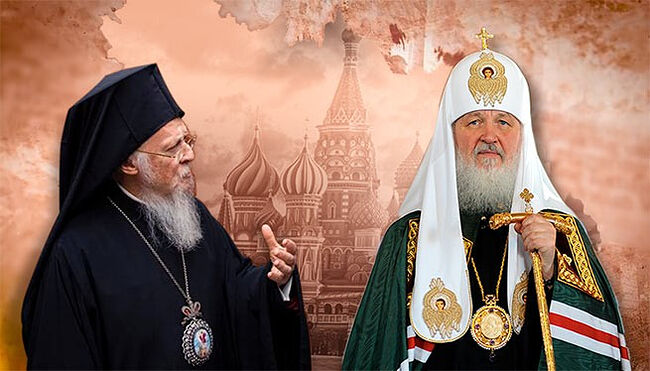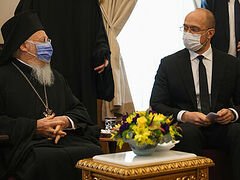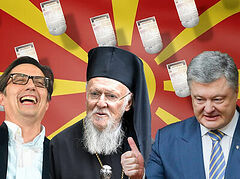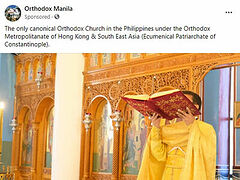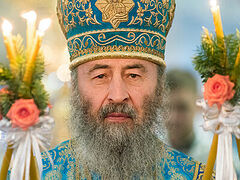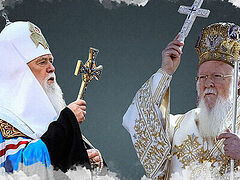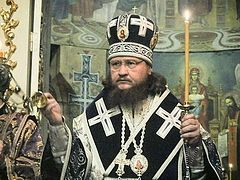Tamassos, Cyprus, February 8, 2021
The Patriarchate of Constantinople has been weaponized against the Russian Church by the great Western powers who are employing a “divide and conquer” tactic against the Orthodox Church, says His Eminence Metropolitan Isaiah of Tamassos.
In a new interview with Romfea, the hierarch of the Orthodox Church of Cyprus explains Constantinople’s historical fear of the Russian Church and how it is used for worldly purposes, as well as his own love and respect for both the Churches of Russia and Constantinople.
It is well known that Met. Isaiah has strong ties to the Russian Church, which were developed, he explains, when he was sent to Russia by his abbot Metropolitan Nikiforos of Kykkos and the previous Cypriot primate Archbishop Chrysostomos I to study the Russian language, theology, Russian Church history, and Russian culture, and to form connections with Russian hierarchs and clergy. Upon returning to Cyprus, he was tasked with caring for Russian-speakers in the capital city of Nicosia.
And after years of studying Russian culture and history, Met. Isaiah states “with certainty” that the Ukrainian schism also relates to the problematic relations between the Patriarchates of Moscow and Constantinople that began after the fall of the Byzantine Empire. As he explains, Constantinople has always worried that Moscow is trying to take its place in the Church hierarchy. Moscow as the Third Rome would be disastrous for Constantinople, as it would lose its historical privileges and international recognition and influence among the Local Churches, and thus it would be less useful for the West and thus easier for Turkey to dismantle the Patriarchate.
This creates a platform of common interests between Constantinople and Western governments, Met. Isaiah states. The Patriarchate was especially highly favored during the existence of the Soviet Union, as it was “considered to be a kind of counterweight to the Soviet communist political and religious geostrategic expansionism where Orthodox Christians lived.”
Thus, religious differences were transformed into a geostrategic religious conflict, since Westerners have always considered the Moscow Patriarchate to be a vehicle of Russian diplomacy abroad. This was certainly true during the Soviet Union, Met. Isaiah says, but things have changed since perestroika, though the “often cautious, even hostile treatment of the Moscow Patriarchate by the West has not changed.”
Only those who know nothing of the Moscow Patriarchate continue to view it as an arm of the state, Met. Isaiah believes. It makes mistakes, but it is no enemy of the faith, he emphasizes.
The Metropolitan of Tamassos recalls that people close to the Patriarchate of Constantinople have told him that in the minds of Westerners, this competitive position is now held by the Russian Federation, embodied in the person of President Putin. Thus, anything that helps Putin’s image “must be demonized and discredited for the benefit of his competitors. And this is where they involve us, as Orthodox.”
“The Moscow Patriarchate is largely victimized today, since Westerners believe that President Putin is using his Orthodox faith, through the Moscow Patriarchate, to rival them in Orthodox countries. It is, then, and also today, a purely political issue of the West’s basic geostrategic objectives, in the face of a Russia that is antagonistic to them,” His Eminence continues.
You can’t agree or disagree with this picture, he says—it’s just reality, and all Orthodox must face this situation today.
“International interests perceive and promote the Ecumenical Patriarch as the leader of all Orthodox religious primates, whom everyone should follow, even the Russians,” regardless of how the Phanar has handled the Ukrainian situation ecclesiastically, the hierarch notes.
However, Met. Isaiah says, “to be fair,” the Patriarchate itself has never publicly supported such a thing or implied that it accepts it. The Patriarchate’s position is that just because its stance overlaps with that of world powers doesn’t mean they influence it, the Cypriot hierarch explains.
Constantinople thinks it is correct in Ukraine, even though its actions serve the West at the same time, he notes.
And turning to his stance towards Constantinople, Met. Isaiah emphasizes that he doesn’t object to support for the Patriarchate that allows it to survive in Turkey, nor does he object to cooperating with the West to protect religious freedom, as long as it respects the history, tradition, and theology of the Orthodox Church. In fact, as Met. Isaiah recalls, he has also studied modern ways of social welfare in America, which has proven useful to him many times.
Thus, as he explains, the reason he and others object to Constantinople’s interference in Ukraine is because the history and tradition of the Church have been confused the foreign policy of states, and thus the future of Orthodox unity is in serious jeopardy. The Church must stand united on its common Gospel and traditions, no matter how much politics try to pit us against one another, Met. Isaiah emphasizes.
As an example of the confusion of Church and politics, the Cypriot hierarch cites the recent statement from the schismatic “Metropolitan” Epiphany Dumenko that several Churches—whose countries belong to the Western sphere of influence, Met. Isaiah points out—will recognize his structure.
“And how will this be done?” the Metropolitan asks. By dividing the Holy Synods of the Local Churches into Russia supporters and Constantinople supporters, he answers. Thus, the schismatics and their Western partners hope that more Churches will recognize the OCU because of their political divide and conquer pressure.
“All this, which is declared, implied and promoted, prescribes a tragic picture for the future of the unity of the Orthodox Church,” His Eminence warns.
He does not believe that such division is Constantinople’s goal, but in reacting to Russia, it has involved itself with people who have other agendas. And the schismatic OCU, which wants to be a Patriarchate, will take advantage of the situation and promote it for its own purposes, Met. Isaiah is sure.
And in the face of this danger of division, we must remember that we are Orthodox first and foremost, His Eminence underlines. However, extra-ecclesiastical decision-making centers promote ethnophyletism, to provoke a conflict between the Slavic and Greek Churches. Met. Isaiah strongly agrees with His Beatitude Archbishop Anastasios of Albania, who has warned that just such an ethnic split is the gravest danger facing the Church today.
“Finally, in the face of this plethora of intertwined international interests, we must consider, that independence and autocephaly in the Orthodox Churches of independent states is decided not by a single Church, but by the Pan-Orthodox Synod of our churches,” His Eminence noted. Exercising its privileges, Constantinople then implements this synodal decision.
Constantinople needs to understand that it has a primacy of ministry, not power, and all, in fact, honor this primacy, Met. Isaiah explains. However, Constantinople’s novel “First Without Equals” theory is very concerning.
In this agony of geopolitics, “we must not forget our common spiritual history and cultural ties with the Orthodox Slavs,” the Cypriot hierarch is sure. Moreover, we must not forget that the Moscow Patriarchate was slaughtered by the USSR, giving the Church hundreds of thousands of martyrs.
“So, in essence, as a martyric Church, the Moscow Patriarchate, and without having mechanisms to enforce political and military goals, has never been a real danger to the Orthodox Churches and peoples,” says the hierarch of Tamassos.
And just as it suffered under communism, so now the canonical Ukrainian Church, with 13 million faithful, 110 bishops, 250 monasteries, 5,000 monks, and dozens of theological institutions are victim to “Orthodox nationalists.”
The reaction of Met. Isaiah and many others to the Ukrainian question is “a form of declaration of respect for Slavic Orthodox history and tradition, but also of our desire to continue our brotherly relations and partnerships. Of course, the Moscow Patriarchate must learn from the mistakes of the past, and so must we.”
However, whoever disturbs the balance of autocephaly of the Orthodox Churches “automatically interferes in our religious freedom and unity,” and this is the message of those Churches that refuse to recognize the schismatic OCU, Met. Isaiah explains.
It is disrespectful to the martyrs of the Churches of Russia and Constantinople to let non-Church centers use the Orthodox like tools in this way, trying to force a divide, the Metropolitan believes.
And turning again to Constantinople’s fear of losing its privileges to Moscow, Met. Isaiah comments that Moscow made a mistake by not attending the Council of Crete in 2016, in that it “gave substance to all the fears of the Ecumenical Patriarch, that they want to replace him as the First Throne, so the survival of the Ecumenical Patriarchate is also in danger.”
As those in Phanariot circles explained to Met. Isaiah, Russian abstention from the council was seen as a lack of respect for Patriarch Bartholomew and his ardent desire for a pan-Orthodox council and as an attack on Constantinople’s privileges and value in modern times.
Pat. Bartholomew thus believes he had to react immediately, lest the Patriarchate lose prestige and place its survival in danger, Met. Isaiah was told by those close to Constantinople.
The international climate of interest was ready and helped him, but the price for his reaction was paid by Orthodox unity, the Metropolitan laments.
Previously, the Local Churches willingly participated in the dialogues initiated by Constantinople both because of its historic privileges and because they trusted Pat. Bartholomew personally, but the Patriarchate struck a crucial blow to itself in Ukraine, His Eminence explains.
If we allow our Churches to be instrumentalized by world powers, we will cease to be the Church of Christ. Thus, now is the time to preserve Church unity, to rebuild relations based on our common faith and worship, and to forgive each other and take responsibility, the Metropolitan implores.
“Since both these Churches really love Orthodoxy, the Ukrainian issue can be resolved,” His Eminence believes.
Follow us on Facebook, Twitter, Vkontakte, Telegram, WhatsApp, Parler, MeWe, and Gab!

